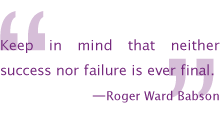Ann Hawkins, of Cambridge-based The Inspired Group, began the year asking us to reflect on this age-old question on LinkedIn. The discussion that followed dragged me personally back to contemplating my high school civics lessons and university philosophy lectures as I probed my current state of successfulness. Click here for the LinkedIn discussion.
The discussion highlighted that there are two sides of “success”. One concept is the process of living a fulfilled life. The other is the concept of materialistic celebrity life. While the latter was acknowledged, the consensus remained in agreement with Aristotle’s argument as presented in his book of Nicomachean Ethics.
“Success is… peace of mind in knowing… that you did your best to become the best that you are capable of becoming”
Lee Jackson
Aristotle calls eudaimonia, translated loosely as “success” or “happiness”, a proactive state of being. It has no final end but is comprised of a continuous string of ends, each building one on the other towards a better, higher good.
According to Aristotle, in order to attain success you must use your skills and knowledge to pursue certain objectives for the sake of a higher objective. To illustrate: one accomplishes a singular objective or goal such as going to the gym and working out. A higher objective would be to get into shape. The highest objective would be the commitment to live a healthy lifestyle. It is the active pursuit of the highest objective that attains success.
He states that once our basic needs are met, each of us actively attempts to live well in our own way. Americans consider this concept an absolute right. It is written in our Constitution that we have the right to the pursuit of Happiness.
“Every goal I have achieved has led me to the next – enjoying the last for just a brief moment.”
Bob Brotchie
Therein was the meat of the discussion. All of the participants have their basic needs met and therefore have the ability, freedom and opportunity to pursue success.
Each of us had developed an individual approach to determine or measure our successfulness. There was a consensus that freedom of choice is considered an essential ingredient to one’s sense of success. Also, for many, our opinion of our successfulness was based on our contributions to the wellbeing of others, either through the work we do or the choices we make. The discussion provided a broad range of attributes of successfulness in life and business to consider and weigh.
The value to me came from stopping for a moment at the beginning of a new year to take a satellite view of my current situation as I map out both my personal and business plans for 2011. It was a good exercise to see if the singular goals I was making on a daily basis were adding to my highest objectives of living a successful and fulfilled life.
What does success mean to you?
